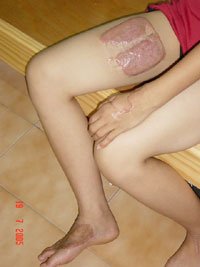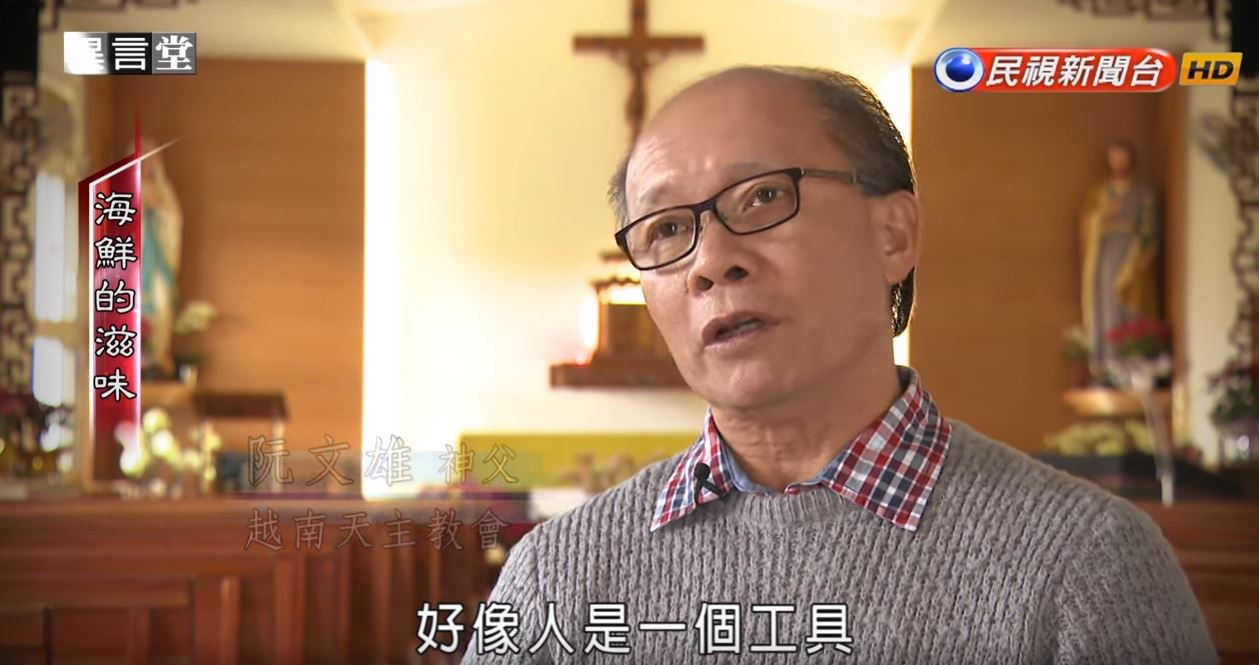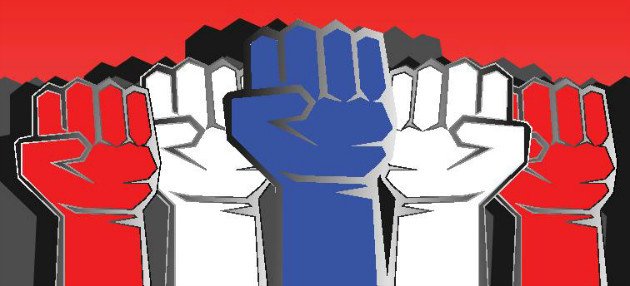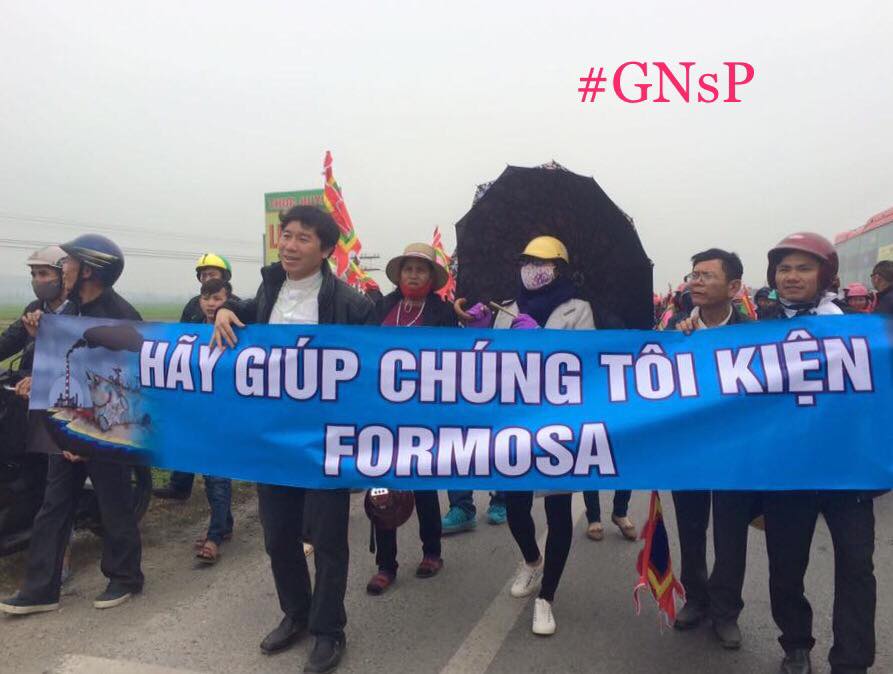Reverend Hung and the staff of Vietnamese Migrant Workers and Brides Office (VMWBO) have helped over 2,000 Vietnamese escape the horrors of labor and sex exploitation since 2004. Under his leadership, the VMWBO has rescued, sheltered, and rehabilitated victims of both labor and sex trafficking, including Vietnamese domestic workers and brides. He has pushed forward prosecutions against employers, labor brokers, and traffickers in Taiwanese courts, and negotiated compensation for lost wages and injuries. Recognizing the importance of coordinating efforts of antitrafficking organizations, Reverend Hung has built coalitions with various legal aid and labor rights NGOs in Taiwan. Rev. Hung has been a true anti-TIP hero for many abused and enslaved Vietnamese workers in Taiwan.

TIER 1: Countries whose governments fully comply with the Act’s minimum standards.
TIER 2 : Countries whose governments do not fully comply with the Act’s minimum standards but are making significant efforts to bring themselves into compliance with those standards.
TIER 2 SPECIAL WATCH LIST: Countries whose governments do not fully comply with the Act’s minimum standards but are making significant efforts to bring themselves into compliance with those standards, and:
a) The absolute number of victims of severe forms of trafficking is very significant or is significantly increasing; or
b) There is a failure to provide evidence of increasing efforts to combat severe forms of trafficking in persons from the previous year; or
c) The determination that a country is making significant efforts to bring themselves into compliance with minimum standards was based on commitments by the country to take additional future steps over the next year.
TIER 3: Countries whose governments do not fully comply with the minimum standards and are not making significant efforts to do so.
TAIWAN (TIER 2 WATCH LIST) Taiwan is primarily a destination for men, women, and children trafficked for forced labor and sexual exploitation. Women from the P.R.C . and Southeast Asian countries are trafficked to Taiwan for sexual exploitation and forced labor. Women and children, primarily from Vietnam, are trafficked to Taiwan through the use of fraudulent marriages, deceptive employment offers, and illegal smuggling for commercial sexual exploitation and forced labor. A significant share of foreign workers primarily from Vietnam, Thailand, and the Philippines are recruited legally for low-skilled jobs in Taiwan’s construction, fishing, or manufacturing industries or as domestic servants, and are subjected to forced labor or involuntary servitude by labor agencies or employers upon arrival in Taiwan.
Many of these contract migrant workers come from poor rural areas and are forced to pay up to $8,000 to recruitment agencies or brokers for a job in Taiwan, resulting in substantial debt that labor agencies and/or employers use as a tool for involuntary servitude. The process for recruitment and placement of the 350,000 foreign workers in Taiwan half of whom are caregivers working in private residences and not protected by Taiwan’s labor law, lacks regulation and oversight and may therefore lead to situations of involuntary servitude.
The recruitment of foreign brides primarily from Vietnam, but also from other Southeast Asian nations, is poorly controlled and, as a consequence, has become a major conduit for the trafficking of girls and women into the Taiwan sex trade, as well as for forced labor. To a much lesser extent, there is internal trafficking of children for sexual exploitation and trafficking of a small and declining number of Taiwan women to Japan for commercial sexual exploitation.
Taiwan authorities do not fully comply with the minimum standards for the elimination of trafficking; however, they are making significant efforts to do so. Taiwan is placed on Tier 2 Watch List for its failure to show evidence of increasing efforts over the past year to address trafficking, despite ample resources to do so, particularly to address the serious level of forced labor and sexual servitude among legally migrating Southeast Asian contract workers and brides.
Taiwan authorities need to demonstrate political will in tackling the trafficking in persons problem on the island. Taiwan should also develop a clear policy and action plan that adequately covers sex trafficking and involuntary servitude among foreign workers and brides. Comprehensive anti-trafficking legislation that criminalizes all forms of trafficking is critical to punishing traffickers who currently operate with relative impunity.
Taiwan has improved its collaboration with local and international NGOs to protect victims of trafficking, particularly P.R.C. citizens, and some members of its legislature are attempting to pass comprehensive anti-trafficking legislation. However, there continue to be concerns over the treatment of the large number of Vietnamese brides present in Taiwan. Taiwan officials concede that the process for admitting foreign brides is not sufficiently monitored, noting that 47 percent of Vietnamese brides in Taipei county are not living with their Taiwanese husbands. Taiwan also remains a destination for foreign workers. The oversight system for their recruitment and stay in Taiwan is not adequately scrutinized. Twenty thousand of the 350,000 foreign contract workers in Taiwan are “runaways” who have left their site of employment in Taiwan for a variety of reasons, including abuse or conditions of involuntary servitude. Taiwan authorities view most runaways as workers seeking to remain in Taiwan illegally, and therefore treat them as law-breakers, detaining and then deporting them immediately upon capture. Labor rights and anti-trafficking NGOs claim with detailed accounts that many of these runaway workers escaped conditions of bonded or forced labor or sexual servitude. Prosecution
Taiwan has a number of related laws that may be used to prosecute traffickers, including laws against slavery and exploiting children in prostitution, but it does not have comprehensive anti-trafficking legislation. On April 13, 2006, Taiwan’s Council of Labor Affairs (CLA) announced that businesses or individuals caught employing illegal workers will be fined up to $23,000. The new regulation, which took effect on April 20, 2006, will be directed at those who knowingly hire illegal workers.
The CLA also announced that it will begin inspecting businesses that employ large numbers of female workers to ensure the workers are not being mistreated and to verify that the businesses have mechanisms in place that allow workers to report sexual harassment or abuse. Over the reporting period, there were 94 indictments and eight convictions for sex trafficking crimes under Sections 231, 296, and 296-1 of Taiwan’s criminal code; in contrast, there was only one reported prosecution for forced labor or exploitative labor practices. Although the CLA identified some victims of involuntary servitude, there were no cases referred for investigation or prosecution by law enforcement or judicial authorities. Punishments for employers or labor agencies found guilty of abuses, including forced labor, were administrative and light, most involving fines. The government has procedures for monitoring companies that employ foreign workers; however, none have been held criminally responsible for any potential trafficking-related violations. Taiwan legislative officials have drafted and are attempting to pass anti-trafficking legislation. Efforts are also underway to tighten immigration procedures and interviewing techniques in detention centers. Protection
The Taiwan authorities provided inadequate protection for many victims of trafficking on the island over the last year, though they made efforts to improve levels of victim support in some areas. Most significant were efforts to identify and treat with care victims of sex trafficking found among the thousands of P.R.C. girls and women arrested for involvement in prostitution or immigration violations. As of April 3, 2006, there were 15 P.R.C. female trafficking victims at detention center facilities. Care for the estimated larger number of foreign victims of labor trafficking, domestic servitude, or sex trafficking among Southeast Asian contract laborers and imported “brides” remained uneven. Taiwan authorities continue to punish victims of trafficking for unlawful acts committed as a direct result of their being trafficked. Taiwan authorities fail to offer P.R.C. and Southeast Asian trafficking victims legal alternatives to their removal to countries in which they face hardship or retribution. Taiwan authorities operate two detention centers that are used to detain undocumented P.R.C. females prior to their forced repatriation, which contain separate, more comfortable facilities for the hundreds of P.R.C. females identified as trafficking victims. It is not clear if these identified trafficking victims are encouraged to assist in the prosecution of their traffickers. Victim protection varied widely among the different localities on the island. While Taiwan authorities provide substantial funding to the Foundation of Women’s Rights Promotion, which in turn funds local NGOs to which it also refers victims ?primarily Vietnamese brides ?there are no centrally funded anti-trafficking shelters on the island. Taiwan authorities have undertaken modest efforts to ensure that brides in Taiwan understand their rights, and also run a hotline for reporting abuse. However, critics claim that the hotline is rarely used and that most potential victims are not aware of its existence.
Taiwan also made stronger attempts to interview foreign spouses upon entering Taiwan, as demonstrated by the increase in the identification of fraudulent marriages (30-35 percent were rejected in 2005). In contrast, care and assistance to Southeast Asian contract workers who have become victims of involuntary servitude is minimal. Taiwan authorities made significant efforts to better regulate the foreign labor sector, but this was focused on minor labor abuses rather than on more serious allegations of involuntary servitude. In 2005, the CLA established 24 offices around the island to provide counseling and other services to abused foreign workers. These centers, however, do not provide overnight shelter for victims; the only shelters available for victims of labor exploitation or involuntary servitude are NGO facilities. In 2004, the CLA established legal aid offices, a hotline, and a booth in the airport aimed to provide information to incoming foreign workers. The CLA reported that it is administering a program that will allow abused foreign workers to be reassigned to another employer or be returned to their country of origin. It also plans to increase the number of labor inspectors. NGOs question whether the CLA will follow through with plans, and many foreign workers remain unaware of the hotline, pamphlets, or shelters. Prevention
Taiwan authorities’ public statements about the dangers of the sex trafficking problem demonstrate the seriousness with which Taiwan evaluates the problem. There is also a growing public awareness and media coverage of the huge forced labor problem found in Taiwan’s relatively unregulated inflow of low-skilled foreign contract laborers. Taiwan has conducted prevention campaigns aimed at foreign workers, including brochures laying out the laws in Taiwan and running radio public service announcements. Taiwan authorities, who participate in anti-trafficking training, also provide funding to international organizations for anti-trafficking outreach, largely for the purpose of counseling girls who may be sexually exploited or trafficked.
VIETNAM (TIER 2) Vietnam is a source and destination country for men, women, and children trafficked for the purposes of sexual exploitation and forced labor. Vietnamese women and girls are trafficked to Cambodia, the P.R.C., Hong Kong, Macau, Malaysia, Taiwan, and the Czech Republic for sexual exploitation. State-owned labor export companies recruit and send workers abroad; some of these laborers have been known to suffer conditions of involuntary servitude or bonded or forced labor. Women from Vietnam are trafficked to Taiwan through fraudulent marriages for sexual exploitation and labor. Other Vietnamese women are recruited to travel to Singapore by offers of marriage to Singaporean men; after arrival they face coercion or pressure that makes them vulnerable to trafficking. Vietnam is a destination country for Cambodian children who are trafficked for the purpose of begging. There is also internal trafficking from rural to urban areas. The Government of Vietnam does not fully comply with the minimum standards for the elimination of trafficking; however, it is making significant efforts to do so. Vietnam has not made sufficient efforts to combat trafficking, particularly the trafficking of Vietnamese women as brides to destinations in East Asia and the forced labor conditions of many Vietnamese workers sent abroad. Although the Vietnamese Government took steps to provide greater protection for Vietnamese workers sent abroad by labor export companies, its oversight of labor export companies remained inadequate. Vietnam’s revised labor code has not been effectively implemented to address cases involving overseas workers who have been subjected to conditions of involuntary servitude or forced or bonded labor. The Vietnamese Government also did not make sufficient efforts to address the growing problem of Vietnamese women who are lured by fraudulent offers of marriage to men in Taiwan, Singapore, and the P.R.C.; many of these Vietnamese brides may have been abused or trafficked. Government action should focus on stepping up efforts to investigate possible trafficking in the labor sector among overseas workers and increasing efforts to identify and protect Vietnamese brides who are potential trafficking victims. Comprehensive anti-trafficking legislation would greatly enhance Vietnam’s anti-trafficking efforts. Prosecution
In 2005, the government continued its anti-trafficking law enforcement efforts in cases of trafficking for sexual exploitation, but made minimal efforts to investigate cases of trafficking for labor exploitation. Vietnam has a statute that prohibits sexual exploitation and the trafficking of women and children, with penalties ranging up to twenty years in prison. Labor forms of trafficking, such as forced labor, are covered under the Vietnamese Penal Code. While the Vietnamese Government has a process by which it apparently monitors labor export companies, there have been no reported investigations or prosecutions of involuntary servitude or forced or bonded labor. Labor attaches in the nine top labor export receiving countries, assigned to look after the welfare of workers and to assist in resolving workplace disputes, rarely investigated complaints from workers who had suffered abuses that constitute involuntary servitude. Over the past year, the government’s crime statistics office reported 182 prosecutions and 161 convictions specifically related to sex trafficking in women and children. While some local government officials reportedly profited from trafficking, there were no reported prosecutions of officials for complicity in trafficking. Protection
The Vietnamese Government made increased efforts to provide protection to victims in 2005. The government allocated funding for a program to receive and provide initial support for women and child sex trafficking victims returning from overseas. Local governments often collaborate with NGOs to provide support to returned trafficking victims in the form of vocational training, farmland, or capital for micro-credit loans. Victims of trafficking for sexual exploitation in Vietnam are usually not detained, arrested or otherwise punished; some victims of involuntary servitude have been punished for breaking their contracts. Victims of trafficking for sexual exploitation are also encouraged to assist in the investigation and prosecution process. The government routinely sends women who engage in prostitution within the country to “rehabilitation” detention centers that provide medical treatment, vocational training, and counseling and seek to deter the women’s return to prostitution. The government’s rehabilitation efforts lack adequate financial resources and usually take place at the provincial and local levels. There were no formal efforts to protect victims of involuntary servitude or forced or bonded labor over the reporting period. Prevention
The Vietnamese Government did not implement specific anti-trafficking awareness campaigns in 2005, but it continued to raise the issue of trafficking in combination with other information and education programs. The government’s official anti-prostitution program underway since 2001 includes trafficking information and education campaigns. Vietnam’s national action plan also tasks the Women’s Union with education of the community on prevention of trafficking.








